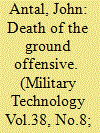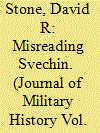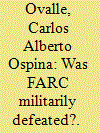| Srl | Item |
| 1 |
ID:
133361


|
|
|
|
|
| Publication |
2014.
|
| Summary/Abstract |
WWI was the third deadliest conflict in history with an estimated 65 million deaths. Since then, military strategist and technologist have attempted to make sense of the carnage. From this perspective " the great war was a test of two methods of defeat: "annihilation or Exhaustion
|
|
|
|
|
|
|
|
|
|
|
|
|
|
|
|
| 2 |
ID:
097041


|
|
|
| 3 |
ID:
116784


|
|
|
|
|
| Publication |
2012.
|
| Summary/Abstract |
Soviet military theorist Aleksandr Svechin is often misperceived as an advocate of strategies of attrition over destruction or annihilation. In fact, Svechin was an historicist, who saw the precise balance between attrition and annihilation, or defense and offense, as constantly shifting as a result of changing material circumstances. A close examination of his theoretical and historical works reveals the depth of his thinking, while his response to Russia's 1916 Brusilov Offensive shows his support for ambitious strategies of annihilation under the proper circumstances.
|
|
|
|
|
|
|
|
|
|
|
|
|
|
|
|
| 4 |
ID:
187244


|
|
|
|
|
| Summary/Abstract |
Russian and Soviet military theorist Aleksandr Svechin developed his theory of military art based on the two cornerstone concepts: annihilation and attrition. Yet these concepts frequently have been misunderstood by his critics, who demoted them from the strategic to the operational level. A close examination of Svechin’s legacy allows reinstating annihilation and attrition as characterizations of the overall dynamics of war rather than mere styles of warfare freely adopted by a given belligerent. When viewed in the context of operational/strategic distinction, moreover, the Soviet theorist's concepts remain as important and practically applicable today as they were in the early 20th century.
|
|
|
|
|
|
|
|
|
|
|
|
|
|
|
|
| 5 |
ID:
152962


|
|
|
|
|
| Summary/Abstract |
The concept of military victory has become opaque and quite different from the days of the industrial wars. Full military victory through total annihilation of the enemy has yielded to more complex ways of achieving political objectives. Eventually the understanding of the fact that the war is unwinnable on martial terms shifts insurgent strategy to one of survival, normally peace talks. It is this very shift of strategy, albeit the absence of insurgent annihilation, that constitutes the core of military victory for the government. Politicians and decision makers, if not military forces, blinded by the victory idea of the past, are unable to understand this reality. Hence, when peace talks are held, they are approached as the end of conflict rather than a shift to war by other means. This gives the upper hand to the insurgents.
|
|
|
|
|
|
|
|
|
|
|
|
|
|
|
|